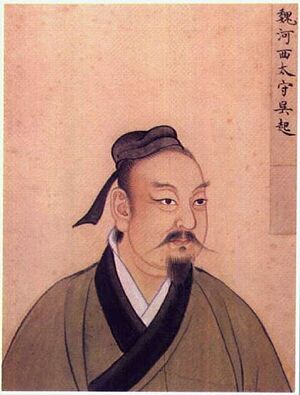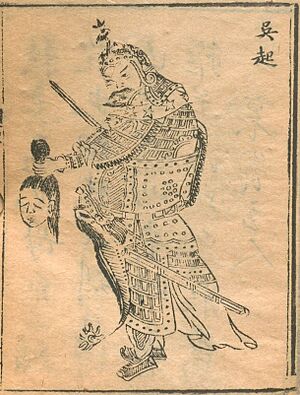Wu Qi facts for kids
Wu Qi (440–381 BC) was a very important person in ancient China. He lived during a time called the Warring States period. This was a time when different states (like small countries) in China were often fighting each other. Wu Qi was a great military general, a smart thinker (philosopher), and a clever politician.
Contents
Wu Qi's Life Story
Wu Qi was born in the State of Wey. He was known for being excellent at leading armies and planning military moves. He worked for several different states, including Lu and Wei.
Leading Armies in Wei
In the state of Wei, Wu Qi led many successful battles. He was made the Mayor of Xihe county. This area was important because Wei had just taken it from the Qin state.
Becoming Prime Minister in Chu
Later, Wu Qi had to leave Wei. He went to the State of Chu. There, King Dao of Chu made him the Prime Minister. This meant he was the King's top advisor and helped run the government.
Wu Qi's Big Changes
Wu Qi started many big changes, called reforms, around 389 BC. His goal was to make the government of Chu better and stronger.
- Fixing the Government: The government was not working well. Many officials were corrupt, meaning they used their power for their own gain. The government also spent too much money on them.
- Cutting Costs: Wu Qi first lowered the yearly pay of officials. He also fired officials who were not useful or good at their jobs.
- Ending Special Privileges: He stopped the rule where families could keep special government jobs for many generations.
- Building a Strong Army: The money saved from these changes was used to create and train a better, more professional army.
Wu Qi also moved many noble families away from the capital city. He sent them to live in areas near the borders of the state. This helped reduce their power in the capital. It also helped more people live in and develop those border regions. He even helped create new building rules for the capital city, Ying. He wanted the city to look more organized and "civilized."
Facing Opposition
Even though his changes made Chu stronger, many nobles and thinkers called Daoists did not like Wu Qi. The nobles said he was trying to change their old traditions. They even complained about his building rules.
Daoists said he loved war and weapons too much. They even called him "a threat to humanity." Wu Qi was also accused of not going to his mother's funeral. He was also accused of harming his own wife to gain trust from a ruler. There is no clear proof that these accusations were true. It is possible his political enemies made them up to make him look bad.
Wu Qi's Death
Because of Wu Qi's reforms, Chu became very powerful. Chu defeated the Yue state in the south and the Wei state in the north. But King Dao died that same year.
At King Dao's funeral, the old nobles planned to kill Wu Qi. They knew he would be separated from his army there. Wu Qi saw the attackers with bows. He rushed to King Dao's dead body. He was killed, but many arrows also hit the dead King. The new King Su was very angry. He ordered that all nobles involved in the attack, along with their families, be put to death.
Lessons from Wei Liaozi
The Wei Liaozi is an old book about military ideas. It tells a story about General Wu Qi. Before a battle, his soldiers offered him a sword. But Wu Qi said no. He explained that a general only needs banners and drums to lead and command. He said, "To command the troops and direct their blades, this is the role of a commander. To wield a single sword is not his role."
This story shows that the general is like the brain of the army. The soldiers are like the body parts that follow orders. Wu Qi believed that soldiers should work together perfectly as a team. He did not want individual soldiers to act like heroes on their own.
Another story in the Wei Liaozi shows this idea. Before a battle, one of Wu Qi's soldiers ran ahead of his group. He killed two enemies and brought their heads back as trophies. Wu Qi immediately ordered the soldier to be put to death. His officers said the soldier was a great fighter. But Wu Qi replied, "He is indeed a fine warrior, but he disobeyed my orders."
Just like Sun Tzu in his book Art of War, Wu Qi believed that discipline and obedience were the most important qualities for a soldier, even more important than bravery.
See also
- Wuqi County
 | Isaac Myers |
 | D. Hamilton Jackson |
 | A. Philip Randolph |



